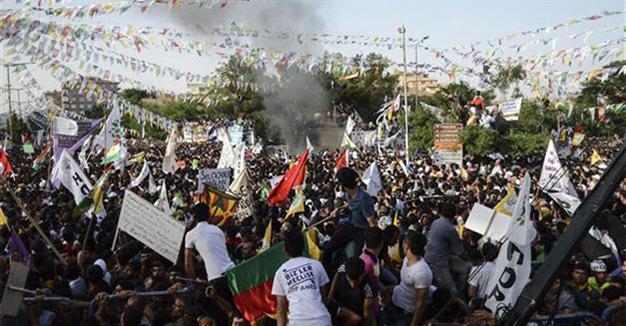Police reveal Turkish codes used by al-Qaeda militants in Turkey
DİYARBAKIR – Doğan News Agency

AFP photo
Police in the southeastern province of Diyarbakır have revealed a list of codes used by al-Qaeda militants in Turkey to communicate with militants in conflict areas, as they worked to uncover details of a 2015 attack on a party rally in southeastern Turkey which killed four people and wounded 210 others.
As part of its investigation into the June 2015 attack on an opposition Peoples’ Democratic Party (HDP) rally in the southeastern province of Diyarbakır, which was among the earliest terror attacks in Turkey deemed a result of the spillover of the security vacuum in neighboring Syria, the police prepared a list of words and phrases used by the militants and sent the list to a public prosecutor’s office to contribute to the probe into the attack.
According to terror experts, the codes were used as a measure against technical searches and eavesdropping by the police and were created by Turkish-speaking members of the group to provide communication among militants located in Turkey and conflict zones.
Some of the words and phrases from the list included: “Memleket” (country), which was used to describe parts of Syria where Jabhat al-Nusra – a former Syrian affiliate of al-Qaeda – had control over other actors; “construction site,” used to describe camp areas; “staff,” used to describe group members who received training and actively participated in clashes; “contractor,” used to describe those who were responsible for the camps; “went to construction,” used to describe the act of going to a conflict; “shopping,” used to describe the conflict; and “customer,” used to describe forces of Syrian President Bashar al-Assad.
The list of codes was added to a document of information on the activities of both al-Qaeda and the Islamic State of Iraq and the Levant (ISIL) in Turkey. Highlighting the statements made during police interrogations of captured militants, the document said al-Qaeda sought to carry out activities in Turkey and that these groups might provide recruits from cities like southeastern Diyarbakır and could also provide material and logistics.
It was also noted that gatherings were held for the purpose of “religious learning” and the radical ideas of armed jihad were being instilled in the participants. The document added that the groups’ sympathizers accepted these notions as their life philosophy, formed local cells, were encouraged to act together by forming organic ties with the group and were diverted to conflict zones to receive armed training after communicating with group leaders.
